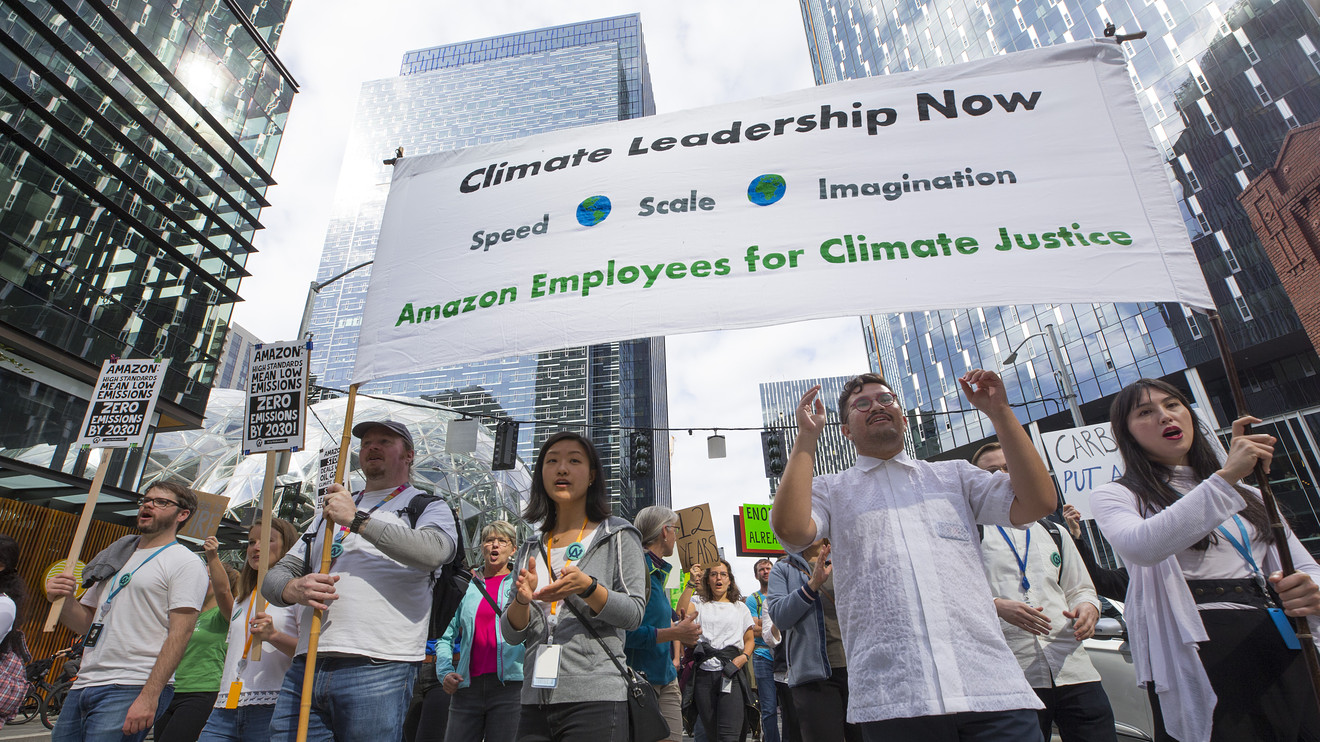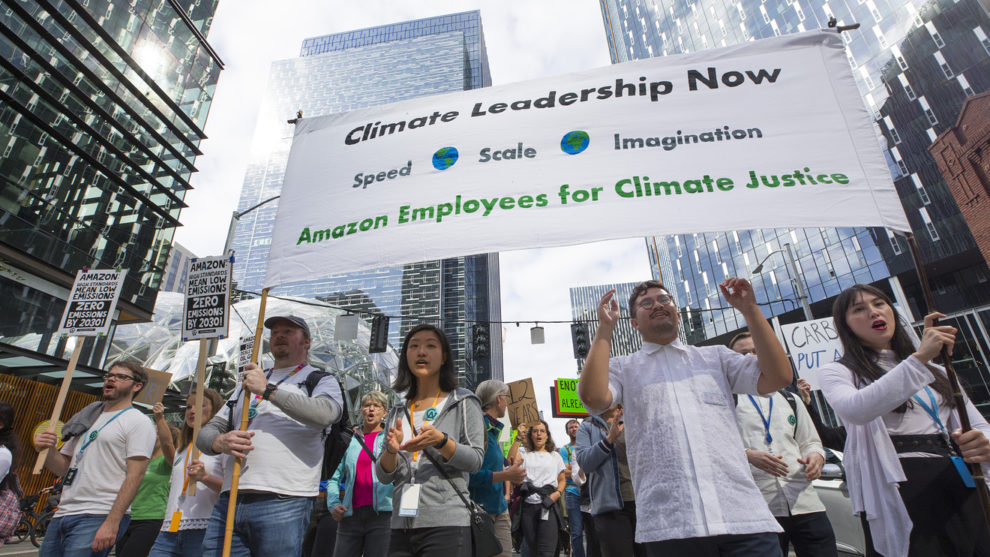 Karen Ducey/Getty Images
Karen Ducey/Getty Images Some Amazon AMZN, -1.21% workers say officials with the tech giant have threatened to fire them for comments they made to the media about the company’s environmental policies.
If anyone of them — or workers at any other private-sector company — end up losing their jobs and try to sue about it, they may not have much of a legal case.
That’s because private-sector workers can’t cloak themselves in free-speech rights, experts previously told MarketWatch. Employees might have other legal provisions and social forces behind them, but not the First Amendment.
‘Congress shall make no law respecting an establishment of religion, or prohibiting the free exercise thereof; or abridging the freedom of speech, or of the press; or the right of the people peaceably to assemble, and to petition the Government for a redress of grievances.’
The government can’t punish or limit freedom of speech, but a private company has the right to censure its own employees, based on its own company policy.
Members of Amazon Employees for Climate Justice said Thursday that company lawyers and HR officials cautioned them after speaking to the Washington Post.
The group urges the company to do more to address climate change, especially seeing that the company profits handsomely from its fast shipping in fossil-fuel burning trucks. (The company is pledging to be carbon neutral by 2040.)
“This is not the time to shoot the messengers. This is not the time to silence those who are speaking out,” Maren Costa, an Amazon User Experience Principal Designer, said in a statement Thursday. She was allegedly was one of the Amazon workers who were cautioned about talking to the press.
An Amazon press representative who declined to be named countered, “Our policy regarding external communications is not new and we believe is similar to other large companies,” adding that the company recently updated its policies “to make it easier for employees to participate in external activities such as speeches, media interviews, and use of the company’s logo.”
The Amazon spokesperson continued, “As with any company policy, employees may receive a notification from our HR team if we learn of an instance where a policy is not being followed. Everyone at Amazon is a builder and encouraged to work within their teams to innovate on behalf of our customers, which includes suggesting improvements to how we operate through those internal channels.”
While the sides debate, it’s important to point out Amazon is a private sector company.
When it comes to government jobs, constitutional protections like free speech, equal protection and due process apply to workers, said Professor Michael Green, director of the workplace law program at Texas A&M University School of Law. But even that doesn’t give employees blanket permissions to speak freely. Courts balance a public employee’s rights against their employer’s rights to keep an organization running smoothly, he noted.
“There’s definitely not a right to protest in the private workplace,” said Paula Brantner, who consults with companies on anti-harassment efforts and other workplace issues as the principal and president of PB Work Solutions.
Ken Novikoff, a lawyer representing companies, echoed that point. “A lot of people think the First Amendment applies to jobs with private employers and it doesn’t,” he said.
But even if workers don’t have a constitutional leg to stand on, it’s not as if employers are itching to fire workers who do stage a protest. “Employers don’t want to fire people because it’s disruptive, and disruption affects profits,” said Novikoff, a partner at Rivkin Radler’s employment and labor practice.
“There’s a human aspect to it,” he continued, “Employers aren’t heartless. They don’t want to destroy someone’s livelihood unless they absolutely have to.”
Workers and management at other businesses have also grappled recently with the consequences of challenging the company line. Late last year, several workers fired from Google said they were being wrongly punished for organizing workers. The company says that’s not the case, because they were fired for breaching data security rules.
In 2018, thousands of Google GOOG, -0.49% employees temporarily walked off the job, upset over allegations the technology company’s gone easy on executives accused of on-the-job sexual misconduct. One accused software creator previously denied the allegations and Google later ended mandatory arbitration to resolve worker complaints.
‘Employers aren’t heartless. They don’t want to destroy someone’s livelihood unless they absolutely have to.’
At the time of the walk out, Google CEO Sundar Pichai said, “we let Googlers know that we are aware of the activities planned … and that employees will have the support they need if they wish to participate. Employees have raised constructive ideas for how we can improve our policies and our processes going forward. We are taking in all their feedback so we can turn these ideas into action.”
Most employees can be fired for any reason
In all U.S. states except Montana, laws start with the presumption that employees are with companies on an “at will” basis, meaning that they can be fired for any reason, Green said.
There are caveats and exception, like prohibitions against firing for race or gender, Green noted. But at-will arrangements cut both ways. It’s easy for workers to leave, and also be shown the door.
Private workers might not be able to justify the legality of their protests with the Bill of Rights, but they may have some protections under the National Labor Relations Act, the professor said. The law protects workers engaged in “concerted activity” to improve their own wages, working conditions and to unionize — or refrain from unionizing — the National Labor Relations Board said.
Employees who want to speak out against their companies have other factors going for them, such as media coverage. “It would be a PR disaster to start firing people,” Brantner said of the Google walkout. The employees have “strength in numbers,” she said, and Google would have to fire everyone or pick and choose — and that “would raise the specter of how certain people being selected.”
Another advantage that protest-minded workers enjoy: The shifting expectations on what’s acceptable and not acceptable in the workplace, Brantner said. “We have fundamentally changed something about our expectations of the workplace,” she said.
This story was updated on Jan. 2, 2020.












